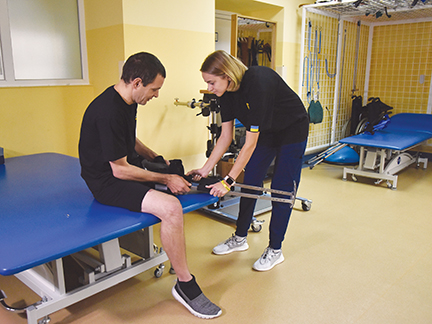By LISA EISENHAUER
As Catholic organizations continue to be deeply involved in the global effort to provide relief to people sheltering within Ukraine and refugees from that war-battered nation, some leaders of the effort are trying to help address specific needs that stand
out amid the flow of humanitarian aid.

Msgr. Vitillo
Msgr. Robert J. Vitillo, secretary general of the International Catholic Migration Commission, is convener of a working group of major global Catholic-inspired
humanitarian organizations called Catholic Response for Ukraine. In July, he spent a week visiting displaced people in Ukraine and refugees in Poland
and learning from those directly involved in relief operations.
"There's need for just about everything," Msgr. Vitillo says. "There are many, many displaced people. The Catholic communities welcome them into the seminaries, into the convents, the monasteries, into diocesan offices and especially into schools. You
have so many people that have lost everything."
Msgr. Vitillo lauds Caritas Internationalis, Caritas Europa, Jesuit Refugee Service, International Catholic Migration Commission, the Order of Malta, Depaul
International, Stella Maris, and CHA. The charitable organizations all are part of Catholic Response for Ukraine and are providing financial support or other assistance or setting up centers across Ukraine and bordering nations that provide housing,
meals, food packets, hygiene kits and mental health assistance.

A patient who lost a leg during the Russian war in Ukraine prepares to be fitted with a prosthesis in Lviv, Ukraine. Msgr. Robert J. Vitillo, secretary general of the International Catholic Migration Commission, says one of the needs he was shown
on a visit to Ukraine this summer was for artificial limbs and professionals trained to fit them.
Pavlo Palamarchuk/SOPA Images via AP Images
Catholic relief organizations and others were assisting victims and refugees within days after the Russian invasion of Ukraine on Feb. 24. They are collaborating with the Ukrainian and neighboring governments on their efforts to distribute aid and help
civilians find safety.
Catholic Response for Ukraine is posting weekly bulletins with statistics on people displaced within Ukraine (6.2 million as of Nov. 1) and refugees across Europe (7.8 million), as well as updates on the military action, United Nations operations and
Catholic church-based responses to the humanitarian crisis.
Identifying unmet needs
One unmet need Msgr. Vitillo saw on his visit was for prosthetics for civilians and soldiers who have lost limbs to bombs or mines. Since his return home to Geneva, he has been trying to identify
organizations that might be able to donate or support local production of artificial limbs and recruit prosthetists with the expertise to train local clinicians to fit patients with the prosthetics.
"I hope that's something we could do because you have so many people who are now disabled as well as having the trauma and the separation from all that's familiar to them," Msgr. Vitillo says.

Compton
Bruce Compton, senior director of global health at CHA, is among those who are working with Msgr. Vitillo to find connections to address the need for prosthetics and prosthetists in Ukraine.
Compton says he has heard of other specific needs that are hampering the humanitarian effort. One is for civilian ambulances to replace those that have been commandeered by the military.
Compton points out that supplying ambulances is not as simple as sending emergency vehicles from elsewhere in the world. "There are standards for ambulances in Europe that are different, so they're looking for appropriate ambulances," he says.
The same official who told Compton in an informal conversation about the need for civilian ambulances in Ukraine mentioned that sending other items that have not been requested often gum up relief efforts.
"I've heard from both church and government sources close to the Ukraine crisis that inappropriate in-kind donations are an issue and they're thankful for organizations like the Catholic Health Association that urge donors to ensure that their donations
conform to the needs specifically identified by those working on the ground," Compton says.
CHA has guidelines and resources for ethical disaster response on its website.
Selective partnerships
Erica Smith is president and executive director of Hospital Sisters Mission Outreach, a nonprofit that sends medical supplies and equipment around the world. Smith co-authored an article that appeared in the summer 2022 edition of Health Progress, a journal produced by CHA, advising donors on how to avoid a potential "second disaster," a reference to the disruption
in humanitarian crisis response that can occur if inappropriate relief items clog supply lines into crisis zones.
Smith says that Hospital Sisters Mission Outreach is highly selective on the partners it works with in other nations. "We have to know that the recipient has the logistical ability to make sure that the supplies can be distributed, stored and used, and
then ultimately thrown away in a way that's not accidentally a hazard," she notes, speaking during an interview in late September.
So far, Smith says Hospital Sisters Mission Outreach has done a few direct handoffs of supplies to organizations providing relief in Ukraine or neighboring nations. It also has sent supplies with physicians who had previous connections in the region and
traveled there to provide assistance.
Her organization only recently identified an on-the-ground partner in Ukraine, the Knights of Columbus, that can meet its high standards for receiving donations. Smith says Hospital Sisters Mission Outreach hopes to ship medical supplies and equipment
to cover immediate needs and establish a supply chain to meet long-term needs for supplies.
Pallets of supplies
Mary Beth Powers, president and chief executive of Catholic Medical Mission Board, says that through September,
her organization has sent 114 pallets of medicines, personal protective equipment and hygiene kits to partners in Ukraine and neighboring nations that are sheltering refugees.

Powers
Powers says the medications her group is sending have been specifically requested. Most of the drugs treat chronic conditions such as cancer and cardiovascular disease.
Powers says the Catholic Medical Mission Board didn't rush to fundraising appeals for Ukraine relief immediately following the Russian invasion. "We waited about two weeks while we were ensuring that we had partners," she says. The partners the charity
is working with include those within the Caritas network.
The funds Catholic Medical Mission Board have raised for Ukraine have largely come from the American public and corporations and gone toward airlifting donated supplies, Powers says. That form of transport is expensive but sea and land routes have been
compromised and some of the supplies have been urgently needed.
Powers said the demand for PPE, hygiene kits and wound care supplies in the relief effort is ongoing. "Those are the things that we're still either having to purchase or looking for donations for, and hospital networks could be helpful in that, I would
suppose," she says.
Ripple effects
Catholic Medical Mission Board also is keeping watch on the ripple effects that the conflict in Ukraine is having on the rest of the world and looking for ways to help. One effect is a burgeoning food crisis
in parts of Africa that haven't gotten needed shipments of Ukrainian grain.
Like other leaders in Catholic relief efforts as well as Pope Francis, Powers points out that one response everyone can supply is prayers that world leaders can bring a peaceful resolution to the Ukrainian conflict. "We're sincere about prayers for peace,"
she says. "You can't underestimate the power of prayer."